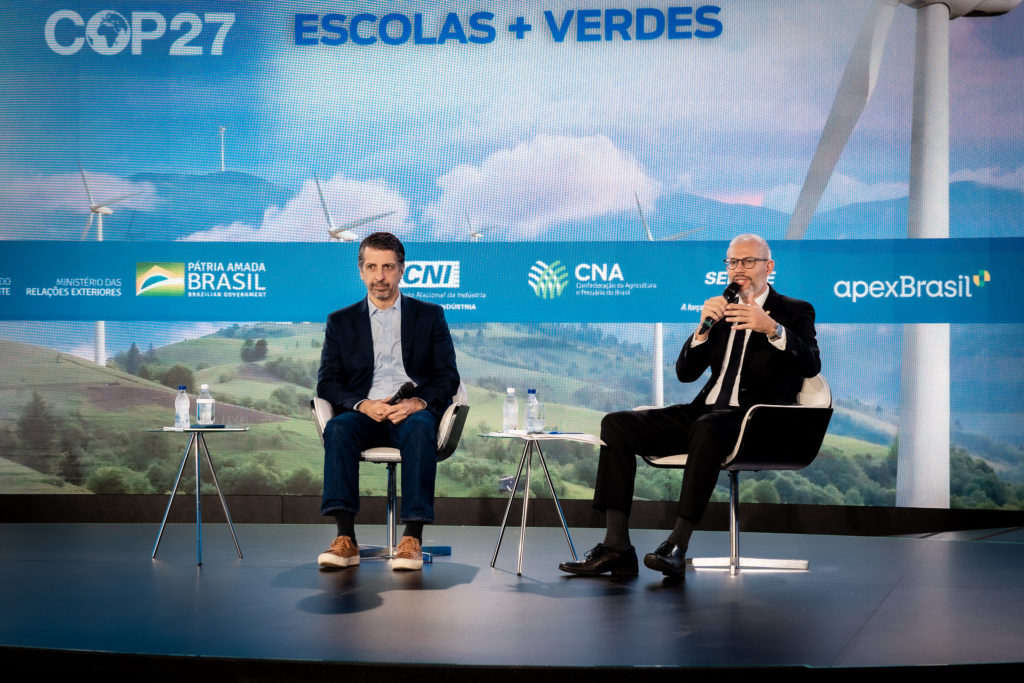Sharm El Sheikh – The Escolas +Verdes program was highlighted among the panels in the Brazil pavilion at the United Nations Climate Conference (UNFCCC COP27) this Tuesday (8). The environmental education initiative launched in September this year aims to foster sustainability in Brazilian schools and is a partnership between the ministries of Environment and Education.
From Brasília, in a space set up by the Brazilian National Confederation of Industry (CNI), the Minister of the Environment (MMA), Joaquim Leite, and the Minister of Education, Victor Godoy, spoke at the hybrid event. From Sharm El Sheikh, the Amazon and Environmental Services secretary, Marcelo Freire, and the International Relations secretary, Marcus Paranaguá, both from the MMA, participated.
Godoy spoke on the importance of bringing environmental education to schools so children can become aware of preservation, sustainability, and change habits in their communities. “We have now managed to launch an initial investment of up to BRL 100 million [about USD 19.74 million] to install biodigesters in schools to treat both organic waste and them to the sewers so it can be treated, generate biogas and also fertilizer liquid, which can be used at the school and even distributed to families,” he said.
According to the Minister of Education, this instrument could be used as an educational tool, in chemistry or sciences classes, for instance. “Teachers can use the biodigester to teach how the process of transforming organic matter into biogas and fertilizer is happening,” he said.
Schools needed an initiative from the federal government for years, Godoy said, noting they could make this first step. “We expect to continue [the project] so, in the next two years, there will be no schools without sewage collection in Brazil,” he declared.
Joaquim Leite showed a video of the application of the biodigester in a school in Venâncio Aires, in the state of Rio Grande do Sul, financed by the MMA. “The Escolas +Verdes program is the first stage of this project. The next is to discuss recycling. The first step of a circular economy is to organize the selective waste collection in schools because what students learn at the school, they will take home,” said the Minister of the Environment, mentioning the Recicla+ program.
Other initiatives involving the two ministries provide for constructing photovoltaic plants and reference laboratories in federal institutes [Brazilian public technical education institutes]. According to Godoy, the idea is to improve the training of teachers and technicians, encourage research, development, innovation, and entrepreneurship in renewable energies, as well as energy management, stimulate and disseminate the implementation of energy efficiency initiatives, and the participation in diffusion, fostering partnerships and sharing information about renewable energies.
Joaquim Leite, head of the Brazilian delegation, is expected to arrive in Sharm El Sheikh next week, on November 15, to participate in person in the activities of the Brazil pavilion and complete negotiations conducted by the Multilateral Political Affairs secretary, Paulino Franco de Carvalho Neto, and the Department of Sustainable Development director, Leonardo Cleaver Athayde, both from the Ministry of Foreign Affairs.
The Brazil Pavilion at COP27 is a partnership between the MMA, CNI, the Brazilian National Confederation of Agriculture and Livestock (CNA), the Brazilian Support Service for Micro and Small Businesses (SEBRAE), and the Brazilian Trade and Investment Promotion Agency (ApexBrasil).
Translated by Elúsio Brasileiro




